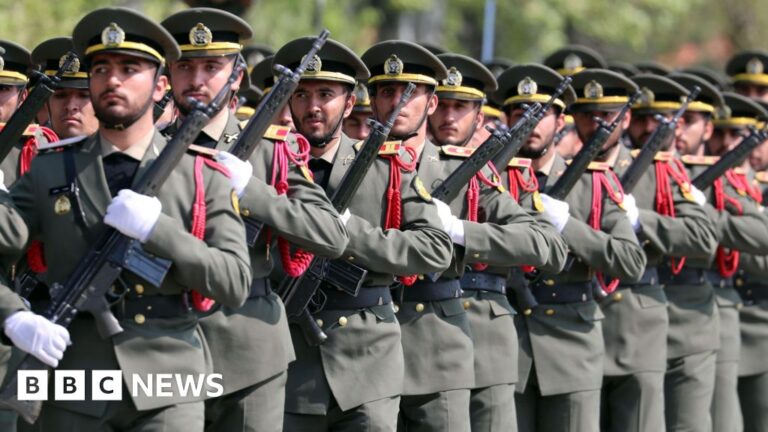- author, Nadine Yousif
- role, BBC News, Toronto
-
Canada has designated Iran’s Islamic Revolutionary Guard Corps (IRGC) a terrorist organization following years of pressure from opposition lawmakers and some Iranian immigrants.
Public Security Minister Dominic Leblanc announced the decision on Wednesday, calling it “an important measure in the global fight against terrorism.”
The move means that thousands of Iranian government officials, including senior members of the IRGC, will be barred from entering Canada.
Iran’s Fars News Agency quoted an Iranian Foreign Ministry spokesman as condemning the move as “unwise and unconventional.”
The IRGC is Iran’s main military, political and economic power and has close ties to Supreme Leader Ayatollah Ali Khamenei.
The organization has its own army, navy and air force that oversees Iran’s strategic weapons and is estimated to have more than 190,000 active personnel.
According to the government, the IRGC, through its shadowy foreign operations arm, the Quds (Jerusalem) Force, provides funds, weapons, technology, training and advice to allied governments and militant groups, and also exerts influence in other parts of the Middle East.
Canada had already designated the Quds Force a terrorist organization, but Wednesday’s announcement expanded the designation to the entire IRGC.
LeBlanc told reporters that the move “sends a strong message that Canada will do everything in its power to combat the IRGC, a terrorist organization.”
“The Iranian regime has consistently demonstrated its disregard for human rights both at home and abroad and its willingness to destabilize the rules-based international order,” he said.
Following this designation, current and former Iranian government officials already in Canada will also be investigated and potentially deported.
Canadian Foreign Affairs Minister Melanie Joly warned that Canadians in Iran could be at risk of arbitrary detention following the announcement.
“My message is clear: for those currently in Iran, it’s time to go home,” she said.
“If you’re planning on going to Iran, don’t go.”
In response, Iranian Foreign Ministry spokesman Nasser Kanani reportedly described Canada’s move as an “unwise, unconventional and politically motivated step.”
“Canada’s actions have no impact on the legitimacy and deterrent power of the IRGC,” he said.
The Canadian government, led by Prime Minister Justin Trudeau, had refused to expand the terrorism designation to the IRGC despite pressure from some overseas, including families of those who died after the IRGC shot down Flight PS752 in Tehran in January 2020.
All 175 passengers on board the plane were killed, including 55 Canadian citizens and 30 permanent residents.
Tehran has claimed the missile attack on the plane was carried out by mistake.
Trudeau said in 2022 that he was concerned the terrorism designation would unfairly target Iranians living in Canada who opposed the regime and fled but had to serve with the IRGC in the past.
Asked by reporters why now, LeBlanc said the decision to designate a group as a terrorist organisation is a “deliberative process” that takes into account the advice of security agencies and foreign policy.
“That’s a standard that must be met under the Criminal Code of Canada,” he said.
The move makes Canada the second country in North America to designate the IRGC as a terrorist organization, after the United States in 2019.
The UK has indicated it intends to take similar measures in 2023 but has yet to do so.

